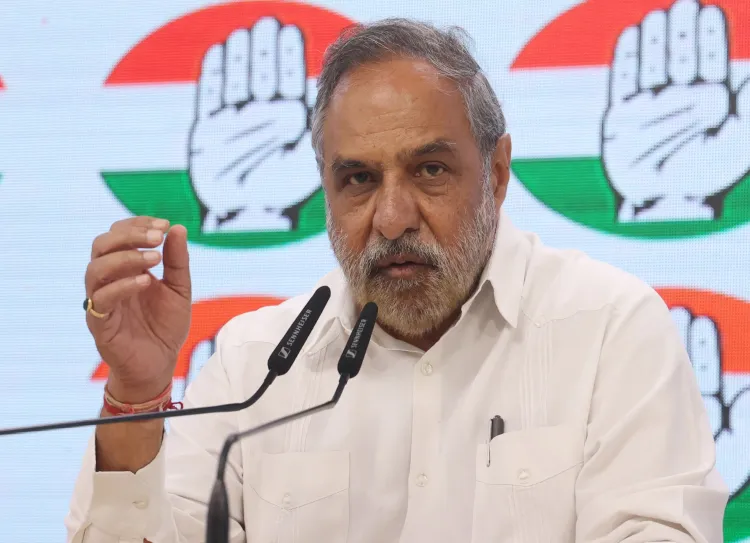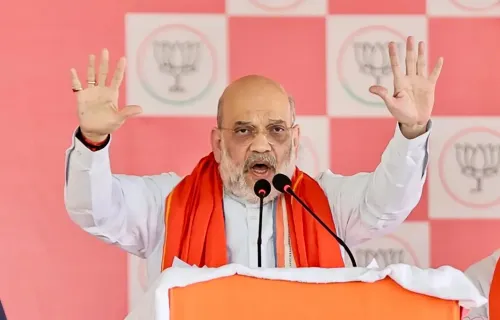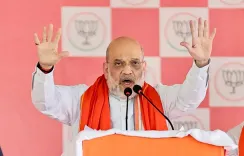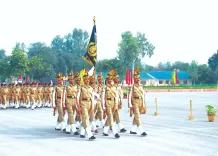Does India's Global Outreach Against Pakistan Indicate Strong Diplomacy?

Synopsis
Key Takeaways
- India's initiative to send all-party delegations enhances diplomatic strength.
- Operation Sindoor responds firmly to cross-border terrorism.
- Political unity in India is essential for global anti-terrorism efforts.
- International collaboration is vital to combat terrorism.
- Pakistan's role in supporting terrorism must be addressed globally.
New Delhi, May 23 (NationPress) Senior Congress leader and former Union Minister Anand Sharma on Friday described the government's decision to dispatch all-party delegations internationally to articulate India's position on cross-border terrorism as a commendable initiative. This action comes in the wake of Operation Sindoor, a military response to the April 22 terrorist assault in Jammu and Kashmir's Pahalgam.
In an exclusive discussion with IANS, Sharma highlighted this initiative as a crucial advancement in Indian diplomacy, stressing the necessity of presenting a united national front on the global arena. He stated that it is a laudable effort to showcase India’s solidarity against terrorism. All-party delegations, speaking with a unified voice, will fortify our national consensus and combat global misinformation.
Sharma, who is the sole Congress member in one of the seven delegations, is scheduled to visit South Africa, Egypt, Qatar, and Ethiopia. He is the second Congress figure, after Shashi Tharoor, to endorse this initiative, even as some party factions have criticized it as a distraction.
Here is the complete interview:
IANS: You are part of the all-party delegation aimed at informing the global community about Pakistan’s role in terrorism and India’s zero-tolerance approach. How do you perceive this initiative?
Anand Sharma: India confronts a severe challenge posed by cross-border terrorism. Organizations like Jaish-e-Mohammed and Lashkar-e-Taiba have persistently targeted our citizens, often with support from Pakistan’s Army and ISI. From the Parliament attack to the 26/11 Mumbai attacks, the list of aggressions is extensive. Recently, innocent Indians were targeted based on their faith, igniting national fury. Our defense forces mounted a decisive response through coordinated efforts involving both the army and air force. As part of the delegation, we will engage with leaders and political representatives from various nations to elucidate the threat that terrorism poses not only to India or South Asia but to the entire globe. Our goal is to present the factual situation and advocate for global action against terror networks.
IANS: What are your opinions regarding the government’s choice to send these all-party delegations?
Anand Sharma: This is a carefully considered initiative by the government. It showcases India’s diplomatic sophistication. The world needs to recognize that despite political divergences, India remains united against terrorism. We aim not merely to express our sorrow but to underline the necessity for coordinated international action against terrorism. Terrorist entities in Pakistan receive state protection. Despite global sanctions and United Nations designations, these groups rebrand and continue their operations. Whether it’s Jaish, Lashkar, or any of their aliases, the same individuals orchestrate attacks. The world must respond decisively and collectively. This delegation is a crucial step in that direction.
IANS: Some political figures have questioned the effectiveness of Operation Sindoor. What is your response?
Anand Sharma: In any democracy, inquiries are both natural and essential. Media, politicians, and citizens will scrutinize government actions. This occurs in democracies worldwide, including the US, France, and the UK. Whenever significant events transpire, scrutiny follows. Nevertheless, there was substantial support for the government’s reaction to the Pahalgam attack. All political factions, including the Congress, participated in the all-party meeting and expressed full support. The Congress Working Committee (CWC) adopted three distinct resolutions, unequivocally endorsing the response and commending our armed forces. Our immediate focus must be on cultivating international consensus, raising awareness of the threat, and holding Pakistan accountable on the global stage.
IANS: Congress has called for a special parliamentary session to discuss the terror attack, Operation Sindoor, and the ensuing cross-border tensions. What is your perspective on this?
Anand Sharma: Requesting a special parliamentary session is not a transgression - it is a legitimate democratic demand. Whether the session is convened remains at the government's discretion. The Opposition has the right to raise demands, and the government has the right to decide. This should not be sensationalized as something extraordinary. During previous conflicts, such as the wars of 1962, 1965, and 1971, Parliament conducted thorough discussions. This is integral to our democratic tradition.
IANS: Do you believe India has delivered an appropriate response to Pakistan regarding the Pahalgam attack?
Anand Sharma: Our response targeted the terrorist organizations directly, the same ones protected by Pakistan's military and intelligence services. Yes, a robust and suitable reply was issued. However, that is insufficient. The international community must recognize Pakistan’s true nature. Pressure must be exerted to compel it to cease exporting terrorism.
IANS: Some Congress leaders, including Rahul Gandhi and Mallikarjun Kharge, have criticized aspects of Operation Sindoor, particularly after the ceasefire announcement. What is your stance?
Anand Sharma: Criticism in a democracy is natural and must be contextualized. Even during the 1962 war with China or the Kargil conflict, political discussions were abundant. However, when it pertains to national security, the nation has always united. Rahul Gandhi and Mallikarjun Kharge attended the all-party meeting and endorsed the government’s response. The Congress Working Committee passed multiple resolutions commending the armed forces. This unity is essential to remember.
IANS: Has India conveyed a clear enough message to dissuade future terrorist actions?
Anand Sharma: Only time will reveal how much Pakistan has absorbed this message. What we can affirm is that India has responded with strength and determination. The entire nation supported this action, which conveys a powerful message.
IANS: Some leaders contend that the government should have discussed the all-party delegation strategy in Parliament first. What is your perspective?
Anand Sharma: Everyone is entitled to their opinion, but national decisions are not always reached through extensive debates. This was a timely and essential measure. Delegations include Members of Parliament and senior political figures. Their findings and experiences will certainly be addressed in the next session of Parliament. That’s the essence of democracy.









